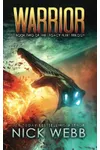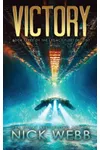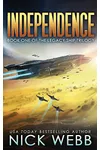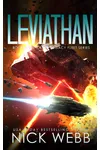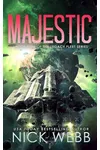Strap in for a cosmic adventure with the Legacy Fleet Trilogy, where humanity battles a relentless alien foe in a dazzling sci-fi saga! Penned by Nick Webb, this gripping series blends heart-pounding military strategy, cutting-edge tech, and unforgettable characters to deliver a story that’s as thrilling as it is thought-provoking. If you love space operas with high stakes and heroic triumphs, this trilogy is your ticket to the stars.
Set in the year 2650, the Legacy Fleet Trilogy follows Earth’s desperate fight against the Swarm, a merciless alien force that nearly wiped out humanity 75 years ago. Now, they’re back, and it’s up to grizzled captains, plucky crews, and aging starships like the ISS Constitution to save the day. With its mix of action, intrigue, and heart, this series hooks you from the first page and never lets go.
How Legacy Fleet Trilogy Began
Nick Webb, a scientist with a passion for starships and Star Trek, launched the Legacy Fleet Trilogy in 2015 with Constitution. Inspired by classic sci-fi like Battlestar Galactica and his own dreams of building real spacecraft, Webb crafted a universe where human resilience shines against cosmic odds. His goal? To write a fast-paced, character-driven space opera that feels both epic and personal, drawing readers into a future where every decision could mean survival or extinction.
The Heart of Legacy Fleet Trilogy
The trilogy kicks off with Constitution, where Captain Tim Granger commands an outdated starship against the Swarm’s devastating return. In Warrior, the stakes escalate as Granger hunts the Swarm’s secrets, unraveling conspiracies within humanity’s own ranks. Victory wraps the core trilogy with a breathtaking showdown, where sacrifices and plot twists keep you glued to the page. Later books like Independence expand the saga, introducing new heroes like Admiral Proctor.
Themes of sacrifice, loyalty, and the cost of war weave through the series, grounded by Webb’s knack for blending hard science with emotional depth. The setting—a future of quantum jump drives, smart steel, and telepathic alien hive minds—feels vivid and immersive. Fans praise the series for its relentless pace and well-developed characters, though some note the third book’s ending feels rushed. Still, the trilogy’s mix of political intrigue, epic battles, and moral dilemmas makes it a standout in military sci-fi.
Why Legacy Fleet Trilogy Resonates
With over 200,000 copies sold, the Legacy Fleet Trilogy has carved a niche in the sci-fi community, earning comparisons to giants like Larry Niven and Robert A. Heinlein. Its relatable characters, like the feisty Granger, and its exploration of humanity’s grit in the face of annihilation resonate deeply with fans. The series’ blend of realism—rooted in Webb’s scientific background—and escapist fun keeps readers coming back, spawning an expanded universe with books like Defiance and Liberty.
Its impact lies in its ability to balance blockbuster action with introspective moments, appealing to both hardcore sci-fi buffs and newcomers. The trilogy’s cult following continues to grow, fueled by its accessibility on platforms like Kindle Unlimited and its knack for delivering nail-biting sequences that linger long after the final page.
- First Book Published: 2015 (Constitution)
- Core Trilogy Books: Constitution, Warrior, Victory
- Expanded Series: Includes Independence, Defiance, Liberty, and more
- Genre: Military Sci-Fi, Space Opera
Ready to blast off? Grab Constitution and dive into the Legacy Fleet Trilogy’s thrilling universe of starships, aliens, and human courage!

